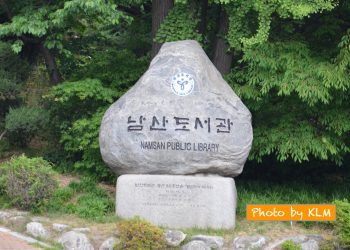Location Nouns and Markers in Korean #1 Posted by Kyung-Hwa on May 23, 2018 in Korean Language, Vocabulary
Recently, several of my friends addressed their confusion with Korean markers, “–에” and “–에서.” They wanted to know how to use them after location nouns in Korean. While English uses prepositions such as, “at, in, from, and to,” associating with a location, the Korean language uses “-에” or “–에서,” to mark location/direction in a sentence. The first post of this series will introduce a list of vocabulary, location nouns in Korean, and the next post will explain how to use these location/direction markers “–에” and” –에서” in Korean.
Where is your favorite place to visit to have fun with your friends, to clear your head, decompress after a stressful day at work or school, or just to kill time? I am a coffee lover, therefore, I often visit 커피숍(coffee shop) or 제과점(bakery). Even though I read most of my books on a tablet and order books online, every now and then I enjoy going to a 서점(bookstore) or 도서관(library) to change the scenery. There are many other places that I enjoy visiting to spend my day. In order to learn when to use “–에” and “–에서” next week, let’s go over some names of places in Korean this week:
1. [koe-pi shyop] 커피숍 : coffee shop
2. [je-kwa-jeom] 제과점 : bakery
3. [seo-jeom] 서점 : bookstore
4. [do-seo-kwan] 도서관 : library
5. [jip] 집 : home/house
6. [hak-kyo] 학교 : school
7. [hoe-sa] 회사 : company, work,
8. [sik-dang] 식당 : restaurant
9. [mi-yong-sil] 미용실 : beauty salon
10. [i-bal-so] 이발소 : barber shop
11. [byeong-won] 병원 : hospital
12. [young-hwa-kwan] 영화관 : movie theater
13. [gong-hang] 공항 : airport
14. [con-seo-teu] 콘서트 : concert
15. [sang-il-pa-ti] 생일파티 : birthday party
16. [jo-reop-sik] 졸업식 : graduation ceremony
17. [je-joo-do] 제주도 : Jeju Island
18. [han-gook] 한국 : Korea
19. [mi-gook] 미국 : United States
20. [kae-na-da] 캐나다 : Canada
I hope you will become familiarized with the above vocabulary, so that you will be ready to follow the next post of the series on location/direction markers in Korean.
Where would you like to go this summer?
저는 제주도에 가고 싶어요. (I would like to go to Jeju Island.)
[ jeo-neon je-joo-do-e ga-go si-peo-yo]
감사합니다. (Thank you!)

Build vocabulary, practice pronunciation, and more with Transparent Language Online. Available anytime, anywhere, on any device.





Comments:
Kyung-Hwa:
An-nyeong-ha-se-yo!(안녕하세요!)
[jeo-neun jal ji-nae-yo.] 저는 잘 지내요. (I am doing pretty good.)
[geu-reon-de yo-jeum jo-geum ba-ppa-yo] 그런데 요즘 조금 바빠요. (But, I am a little bit busy these days.)
[han-kook-e ga-jok-kwa chin-goo-deul-i it-seo-yo] 한국에 가족과 친구들이 있어요. (I have family members and firedns in Korea.)
한국어와 한국 문화에 대한 관심을 보여 주셔서 감사해요. (Thank you for showing interests in the Korean lanauge and culture.)
Kyung-Hwa:
@Kyung-Hwa Tristian 씨,
An-nyeong-ha-se-yo!(안녕하세요!)
Unfortunately, I do not know anyone to meet your need. Sorry!
한국어 공부 열심히 하세요 ^^~